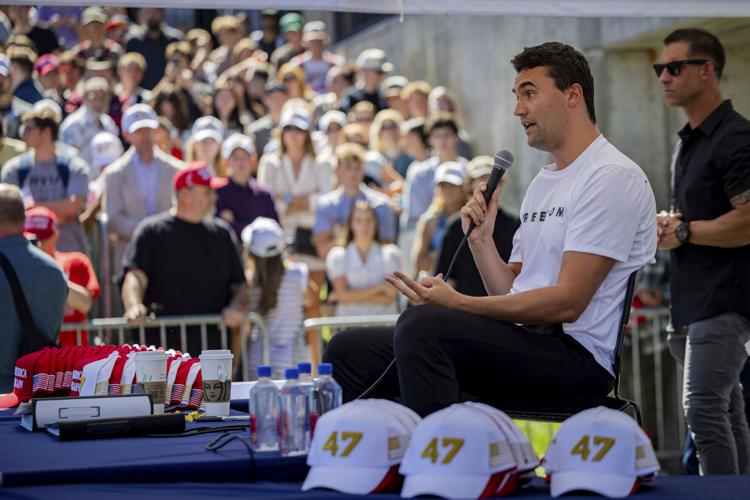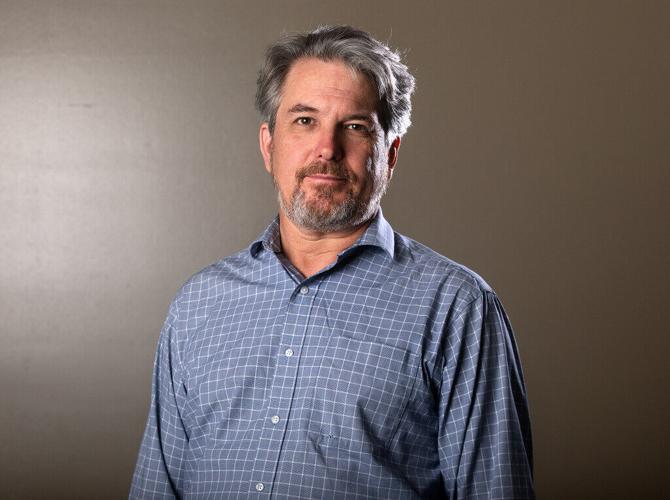Speeches on the town square or campus green.
Breakfasts at diners.
Town halls.
Protests.
Congress on your corner.
The American political tradition is rich with opportunities for elected officials and candidates to see their constituents face-to-face. To press the flesh, kiss babies, make a personal connection.
But that tradition of ŌĆ£retail politicsŌĆØ had already dwindled before last week, and it seems on the verge of withering away altogether now, with the assassination of Charlie Kirk in Utah last week.
Kirk, who lived in the Phoenix area, wasnŌĆÖt a politician, of course, but he engaged publicly as if he were an old-fashioned one, touring campuses to give speeches and engage in debates.
People are also reading…
My kids have both seen him on different Arizona campuses. None of us agree with him on much, politically, but the free-speech spectacles he created were intriguing, in part because they are rare in these times.
The effects of his assassination on public political speech were already being felt last week. U.S. Sen. Ruben Gallego, who has been testing the waters for a possible presidential run in places like Iowa, canceled two planned appearances in another early-primary state, Nevada, this weekend.
ŌĆ£Out of an abundance of caution for town hall participants, attendees, and members of the media, we have decided to postpone Senator GallegoŌĆÖs upcoming Las Vegas town hall,ŌĆØ an announcement of the cancellation read.
In-person meetings a choice
Tucson, of course, plays an unfortunate and unwanted role in this pullback from in-person engagement.
The Jan. 8, 2011, mass shooting and assassination attempt took place at a Congress on Your Corner event at Ina and Oracle, as you probably remember.
Then-Rep. Gabrielle Giffords was shaking hands and talking to a long line of constituents, with Ron Barber, her district director, at her side. Barber ŌĆö who like Giffords was among the 19 people shot that day, including six who died ŌĆö recalled this to me when we talked Friday.
Barber replaced Giffords in Congress almost 18 months later, and he tried to keep public engagement going. One of his first acts was to do another Congress on Your Corner event in Tucson.
There was a larger police and security presence, and he was a few hours late coming in from D.C., but 350 people were waiting for him, Barber recalled.

Charlie Kirk speaks before he is shot during a Turning Point event at Utah Valley University. Public political interaction has dwindled over the years, and KirkŌĆÖs fatal shooting could bring an end to such events.
ŌĆ£I was determined that we would not allow what happened on Jan. 8, 2011 to affect how we would engage with constituents,ŌĆØ he said. ŌĆ£The Congress on your Corner concept was about personal engagement with your constituents.ŌĆØ
ŌĆ£I donŌĆÖt know how you can do this job without meeting with your constituents.ŌĆØ
Unfortunately, that sort of event is not happening anymore in the new district that most overlaps the one Barber represented, Congressional District 6.
In part, what changed things was the pandemic. People got used to meeting online, as these technologies became more widespread and easy to use. Meeting the general public in person seems like less of a requirement and more of a choice.
Rep. Juan Ciscomani, who represents most of the area Barber and Giffords represented, rarely does public events that are announced in advance. Instead, most of the time, we find out that he has met with people at a school or a business after the fact, when photos are posted. If the media is invited, we have to RSVP to find out the location.
He also has done telephone town halls ŌĆö another unsatisfying simulation of public engagement.
ThereŌĆÖs both a political and a security calculation, of course. Republican leaders have recommended not to hold these events in order to avoid public confrontations that create viral videos. And now, although indoor events can be pretty well secured, thereŌĆÖs the sense that a shot could ring out anytime.
ŌĆśWeŌĆÖre not going to let it stop usŌĆÖ
Running for election requires personal contact and is normally one of the best things about running, candidates often say. But it can also be unnerving.
City Council candidate Janet ŌĆ£JLŌĆØ Wittenbraker was one of two local candidates who learned in the last two weeks that their political signs had been defaced with stickers saying ŌĆ£Make assassinations great again.ŌĆØ
The other was fellow Republican Daniel Butierez, who is running against Democrat Adelita Grijalva in the Congressinal District 7 special election.
Especially at a time like this, putting a sticker like that on those signs is just an awful thing to do. People have a right to run for office without overt efforts at intimidation through threats.
ŌĆ£IŌĆÖm a little upset, but IŌĆÖm not intimidated,ŌĆØ Wittenbraker told me Friday. ŌĆ£IŌĆÖm going out doorknocking tomorrow.ŌĆØ
Butierez said heŌĆÖs proceeding as usual. He went to a Mexican Independence Day celebration at the Ra├║l Grijalva Community Center on Friday night, he said Saturday. He shook hands with a crowd largely supportive of Democrats without any problem, and with plenty of positivity, he said.
His wife Paula added, ŌĆ£WeŌĆÖre going to be cautious, but weŌĆÖre not going to let it stop us.ŌĆØ
Free speech could be in peril
Another form of public political gathering, demonstrations, is also under threat.
The worry of violence is part of it ŌĆö anti-Trump protesters in Tucson and around the country have already been doing safety trainings, recognizing the heightened tensions around the country.
But perhaps an even greater fear now is that of a government crackdown. President Trump blamed KirkŌĆÖs assassination immediately on rhetoric from the ŌĆ£radical left,ŌĆØ a term he applies freely to people who oppose him.
He has also asked prosecutors to charge the people he thinks are funding protests against him. The belief that these are not organic protests motivated by peopleŌĆÖs personal beliefs is baffling if youŌĆÖve met with any protesters or leaders. TheyŌĆÖre not being led by George Soros.
But the fact that theyŌĆÖre not part of a racketeering enterprise doesnŌĆÖt mean someone wonŌĆÖt try to accuse or accost them.
It would be ironic and unjustified if a violent attack on free speech, like Charlie KirkŌĆÖs assassination, leads to a crackdown on free speech.
But it would be a continuation of a trend weŌĆÖve already been experiencing: The diminishing opportunities for public political engagement.

├█╠ęė░Ž±AV columnist Tim Steller
Contact columnist Tim Steller at tsteller@tucson.com or 520-807-7789. On Bluesky: @timsteller.bsky.social











